- We have relatively less data for Rocket than for the other hosts (started tracking Q4 of 2022), so take it for what it is.
- Flywheel has Fastly CDN enabled by default, and you cannot disable it from the user panel. I put this in the category of “web host trying to make the experience better for its users,” so I can’t really hold it against them, but it still needs to be mentioned.
- One caveat: GoDaddy had the most problems with downtime throughout all this time. So in short, it was fast…when it worked.
Reality check 🔮
I realize that many of you will be more interested in who’s actually the most performant host right now instead of last year or even three years ago. Perfectly understandable!
So here it is:
Who’s the fastest this year and month?
Here are the fastest hosts of 2024 so far (ordered by US load time; dark green represents the lowest load time in column):
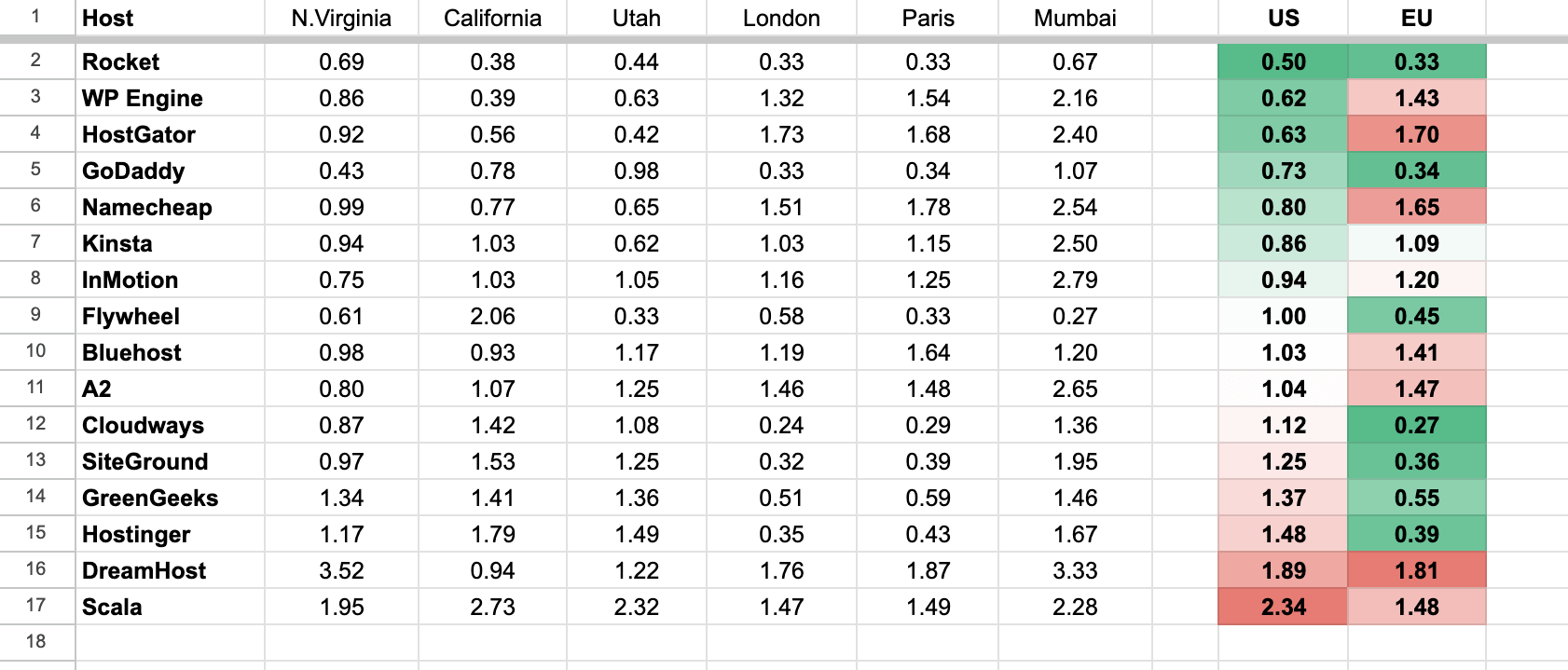
And if you’re invested in the fastest WordPress hosts this month, here’s that:
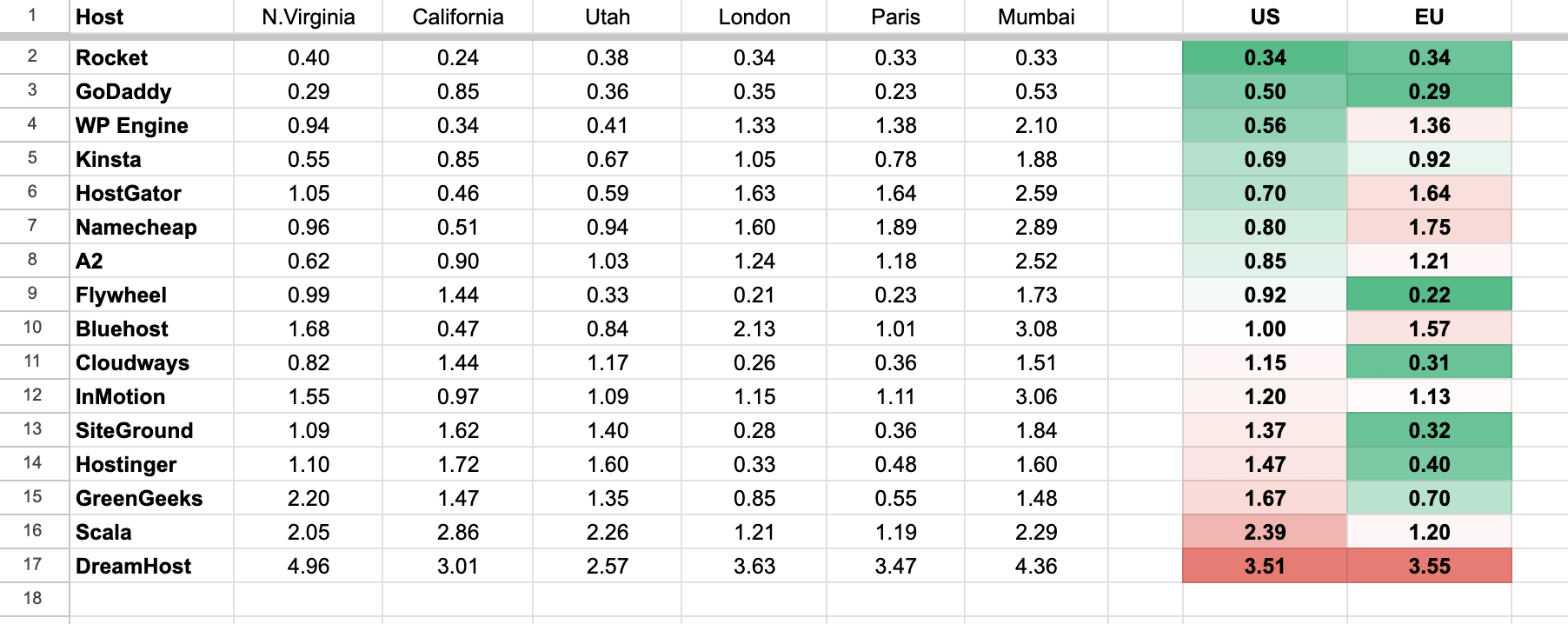
Not a good month for DreamHost.
Who’s the most consistent over time?
Conclusion: based on our tests, Rocket and Flywheel deliver the most consistent performance over time.
Okay, so the average speed is one thing, but the next thing I wanted to find out was how each hosting company’s loading times have progressed over time.
It just seemed interesting to see whether these hosting companies offer the same performance year after year or if there’s any variance at all. Ideally, you’d want to see them getting faster – as every hosting company learns how to be a better hosting company with each year of experience 🤗…though that seemed like a fairytale, honestly, so I really wasn’t expecting much.
I tried various visualization methods that could effectively depict these trends in load times for different web hosts. An approach that ended up being the most worthwhile was using line charts to track the performance of each host from quarter to quarter.
These charts are straightforward:
- each line represents load times as measured from a given region for a single host;
- each point on that line marks the loading time recorded for a particular quarter;
- there’s a trend line to show progression over time.
This visual representation helps pinpoint which hosts have improved their speed, which have remained consistent, and which may have experienced declines. Here’s the gallery of hosts:
As you can see there, there actually is quite a lot going on(!). Most of the hosts have managed to improve their load times each year. Only a couple of them stayed roughly the same or got worse. I’d also like to point your attention to the raw values (in seconds) on the Load Time axis. For example, even though Flywheel’s fall from grace looks pretty steep, it’s only an actual change from 0.2s to 0.8s of load time, which is still pretty great.
Okay, so those are the individual hosts, when looked at one by one. However, I also wanted to see them all in one chart. To do that, I created a cumulative average chart. This chart aggregates the loading times of each host across all recorded quarters while also smoothing out short-term fluctuations to reveal longer-term trends. By doing so, it highlights which hosts have consistently maintained fast loading times and which have seen their performance vary.
Here’s the chart for measurements from the US:
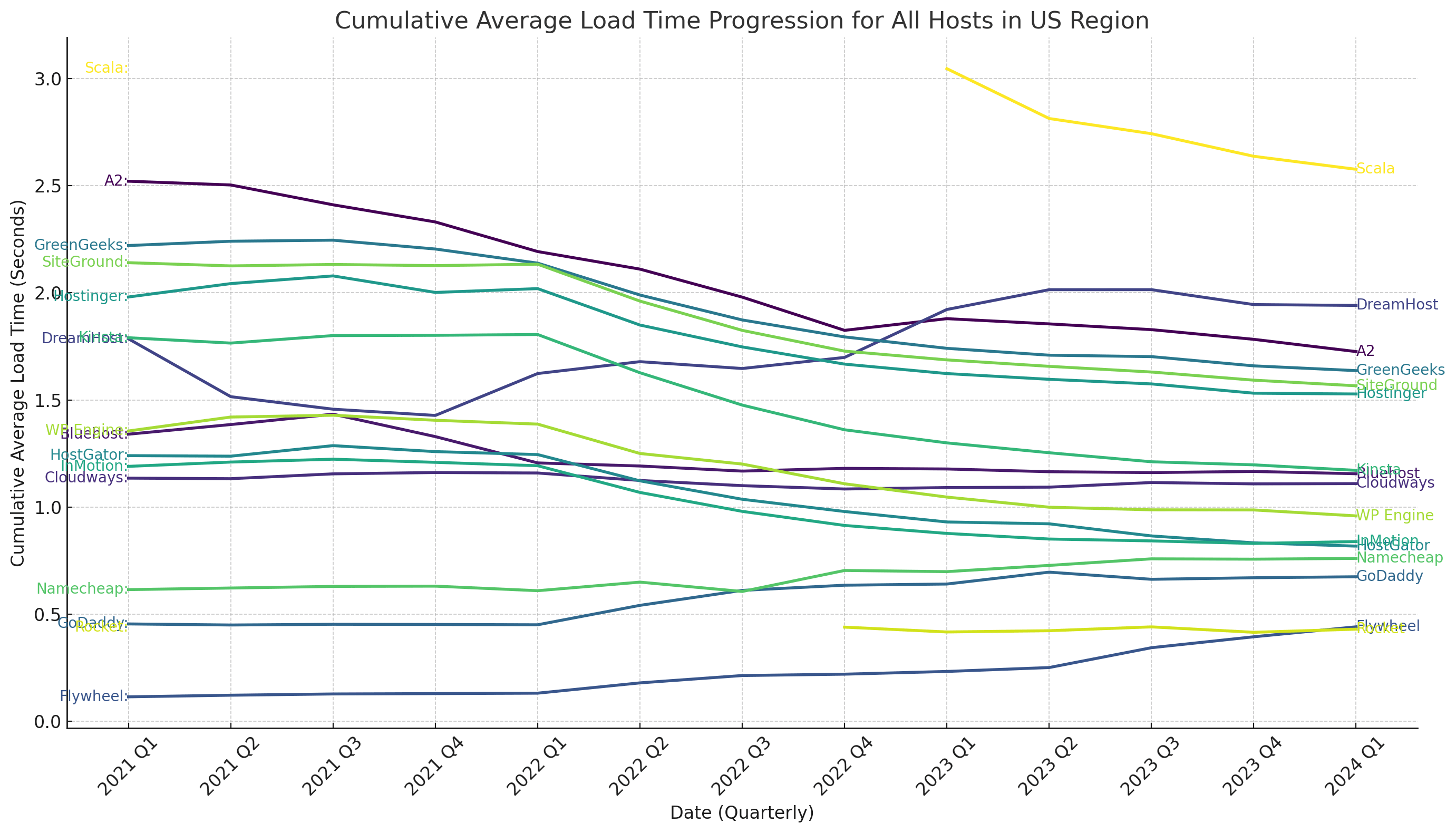
Here it is for the EU:
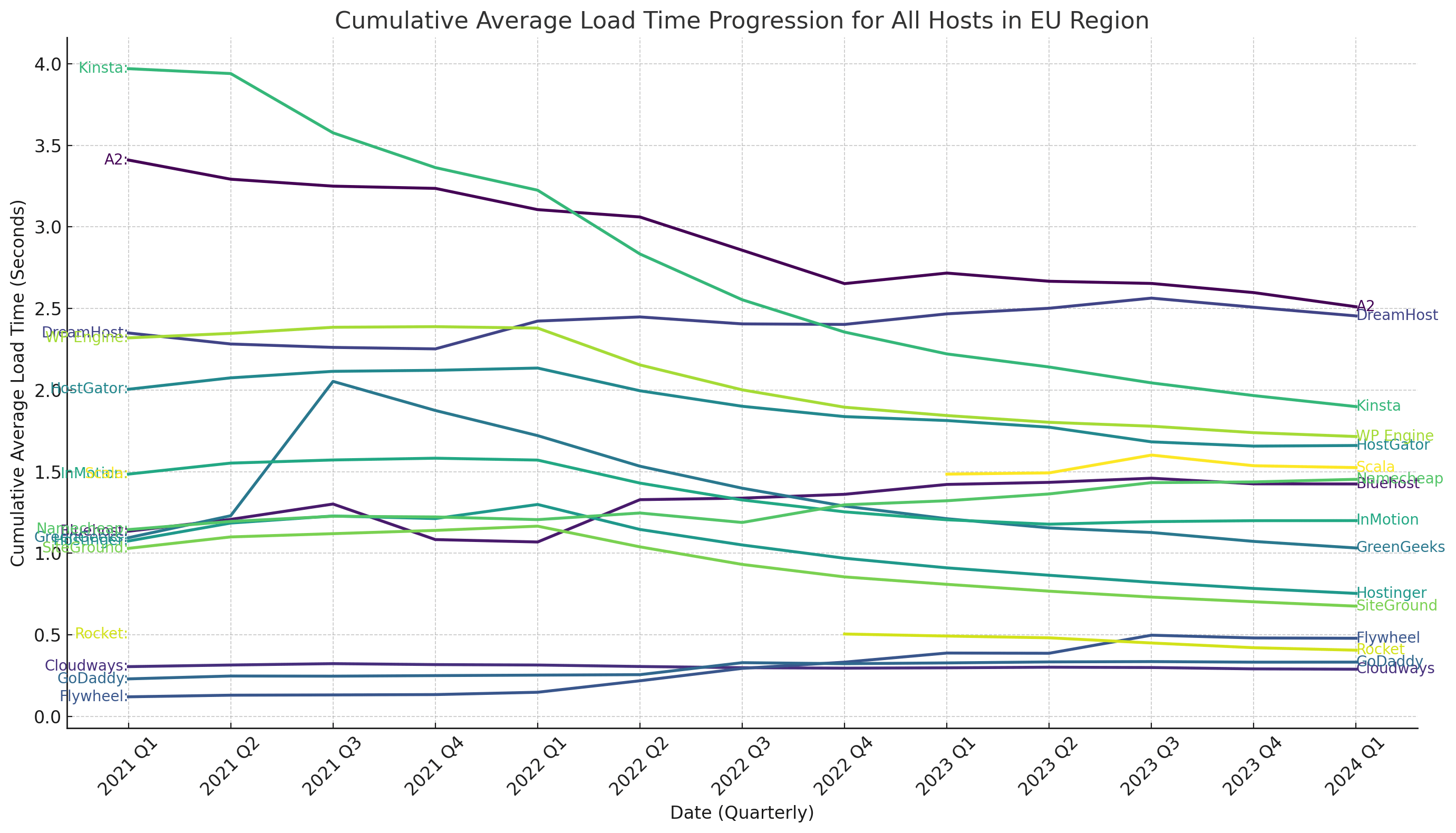
The findings were revealing. Some hosts showed remarkable consistency with minimal fluctuation in speed, while others displayed significant variability.
- For example, check out the aforementioned Flywheel, which appeared to be worsening but actually still sits at the very bottom of the chart (it’s the fastest).
- Cloudways, for comparison, has the flattest chart of all the hosting companies. This is in no way surprising; let’s not forget that they don’t actually have any server infrastructure of their own but instead host through the cloud hosting giants like Google or Digital Ocean (our test setup uses Digital Ocean).
Consistency vs peak performance
The above shows us a visual picture of how consistent those hosts are when it comes to speed, but let’s also take it from a different perspective and investigate the relationship between consistency vs peak performance among these hosting services.
This involves looking at the average load times and comparing them with their variability (standard deviation) to understand not just who is the fastest on average but also who maintains the most consistent performance.
Here’s how to do this:
- Get the average load time and standard deviation for each host to gauge both speed and consistency.
- Create a scatter plot where each host is represented by a point. The x-axis shows the average load time (speed), and the y-axis presents the standard deviation (consistency).
This will help visualize which hosts not only offer low load times on average but also maintain consistent performance over time:
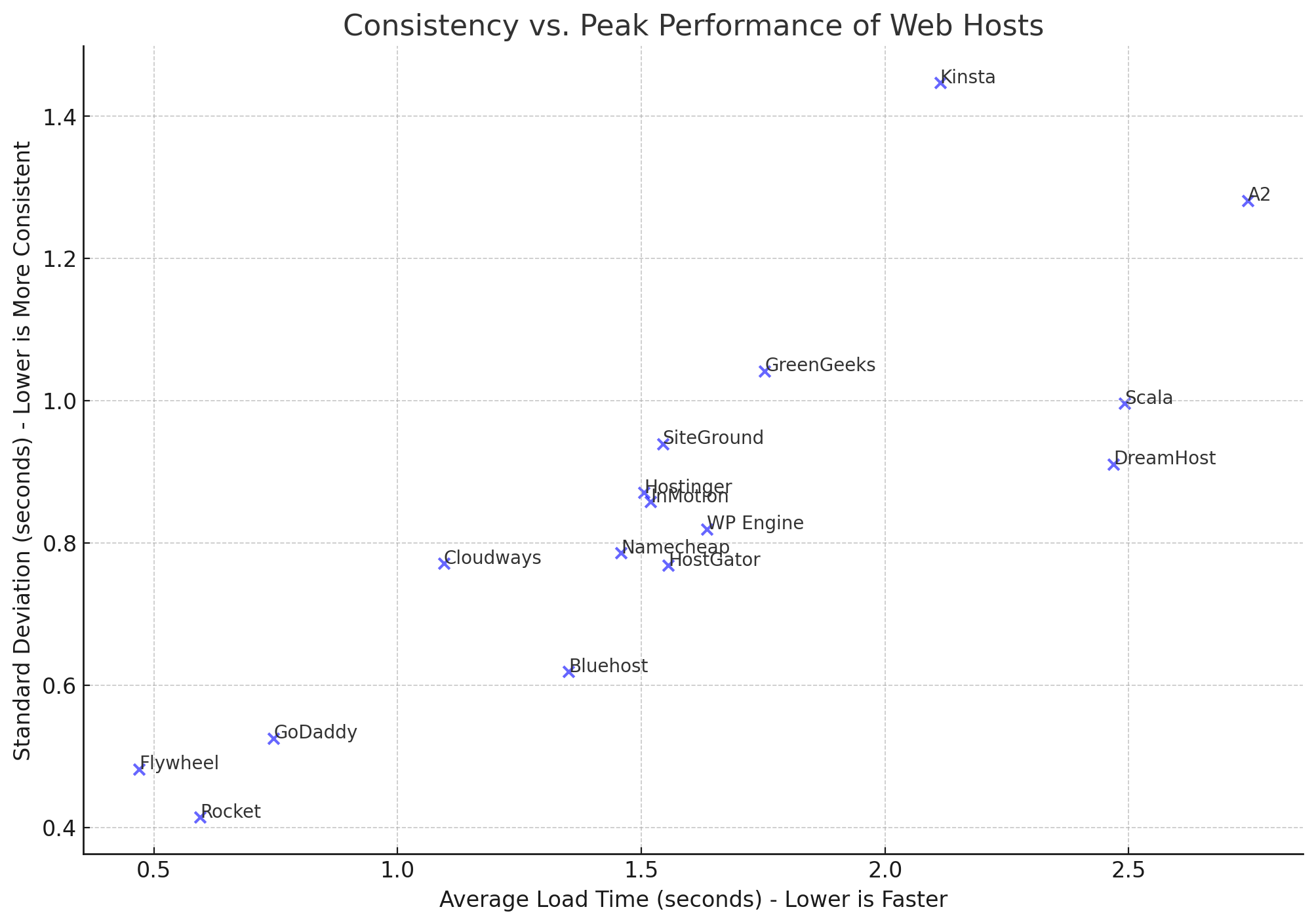
Some observations:
- Lower left quadrant. Hosts in this area offer both low average load times and low variability, indicating they are not only fast but also consistent. All things considered, the three hosts there – Flywheel, Rocket, GoDaddy – are the ones that show the best combination of speed and consistency over time.
- Upper right quadrant. Hosts here have higher average load times and greater variability, suggesting that you might have some better and worse periods with them.
- There isn’t much of anything in the lower right and upper left quadrants.
- There are multiple hosts in the middle, meaning that they exhibit good consistency and performance throughout.
Who’s the fastest “managed WordPress” host?
Conclusion: Flywheel is the fastest managed host, GoDaddy is the fastest standard host. Managed WordPress hosts are not significantly faster than standard hosts.
So there’s this thing I’ve been thinking about, and not just me but probably everyone who’s ever seen the label “managed WordPress hosting.” Are those hosts actually any faster?
We actually do have a handful of managed setups in our test site portfolio, so I could find that out. I pitted those managed” hosts against “standard” hosts. Here’s the lineup:
Standard hosts:
- A2
- Bluehost
- DreamHost
- GoDaddy
- GreenGeeks
- HostGator
- Hostinger
- InMotion
- Namecheap
- Scala
Managed WordPress:
- Cloudways
- Flywheel
- Kinsta
- Rocket
- SiteGround
- WP Engine
To determine who comes on top, I checked the overall average load times for each host across all regions and then ranked them within their respective groups.
When put all together, here are the top three fastest hosts in each category (according to their average load times):
Or, to look at a broader picture, here are the average load times for all standard hosts and all managed hosts:
Do you get more speed with managed WordPress hosts? Yes, but only marginally.
In the end, paying premium on managed hosts doesn’t seem to be worth it if all you’re after is speed.
Speaking of money:
Who’s the fastest cheap WordPress host?
This one’s quick: it’s Namecheap.
They’re not only the cheapest host in the lineup but also one that sits near the top of the pack speed-wise (at no. 5). Here’s how the price vs speed picture lines up:
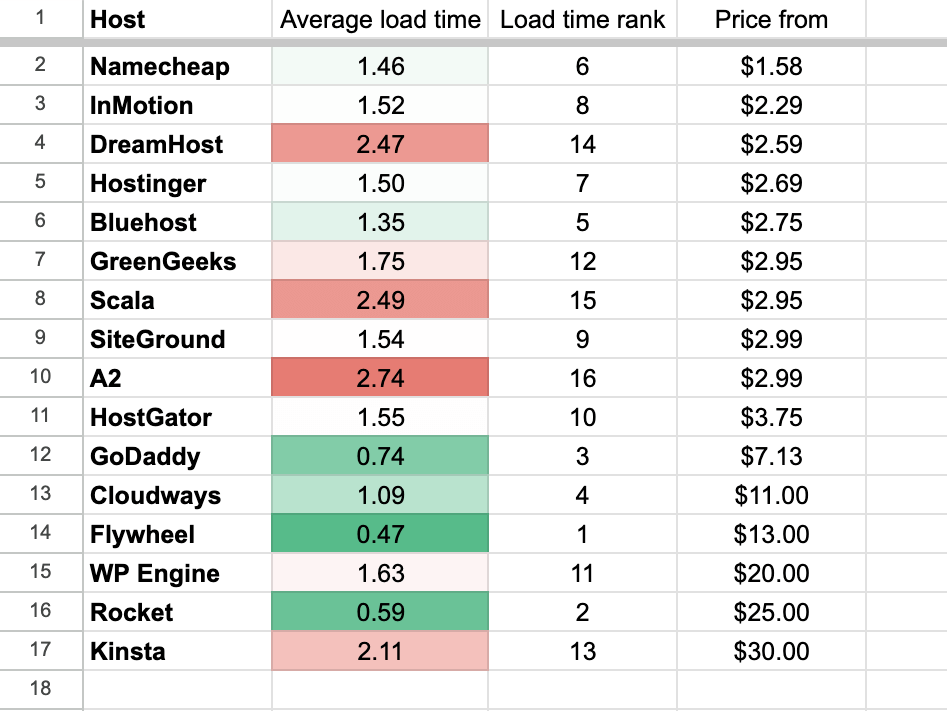
But hold on, we’re not done with the topic of pricing yet. Far from that, actually! I have something much more interesting for you next:
“Speed Dollars” – or how much speed you get for your buck
The topic of money is always interesting and an important one when deciding which of these hosting companies to choose. You’d assume that the more you invest, the better performance you should get overall – faster load times, less downtime, better user experience in total, etc.
But is that really the case?
So just taking the speed aspect into account, I wanted to calculate “how much speed” you get for each dollar spent.
Introducing Speed Dollars!
The need for speed…and value!
I was wondering how to make these calculations all make sense and for the final Speed Dollar amounts to actually represent anything. After some trial and error, I’ve decided to go with the following:
I started by noting the slowest speed a website took to load across the entire data set, which was 6.55s.
Wondering what the host was that recorded this slowest load time? I’m not going to tell you. You’ll have to look through the data set yourself for that easter egg. 😃
Next, I asked a simple question: For every dollar or euro I spend, how much can I reduce that sluggish 6.55 seconds?
To find the answer, I used a formula that’s pretty straightforward:

Here’s what that math does:
- 6.55 – average load time: This tells us by how much a hosting service can decrease that maximum sluggish time.
- Divided by price: This shows how much each second of speed improvement costs.
The result? The Speed Dollar. The higher this number, the less you pay for each second your page loads faster, which means you’re getting more speed for your buck!
Now for the results:
Speed Dollars for tests from the US
Conclusion: Namecheap and InMotion Hosting give you the “most speed per dollar spent.”
Here are the calculated Speed Dollar values, indicating how many seconds each dollar spent can shave off from the maximum load time of 6.55 seconds (when measured from testing locations in the US):
- Namecheap: 3.66 seconds shaved off per dollar spent
- InMotion: 2.49
- Bluehost: 1.96
- Hostinger: 1.87
- DreamHost: 1.78
- SiteGround: 1.67
- GreenGeeks: 1.67
- A2: 1.62
- HostGator: 1.53
- Scala: 1.35
- GoDaddy: 0.82
- Cloudways: 0.49
- Flywheel: 0.47
- WP Engine: 0.28
- Rocket: 0.24
- Kinsta: 0.18
Once again, Namecheap comes on top as the host that offers the best value in terms of reducing load time for each dollar spent, making it a highly cost-effective option.












